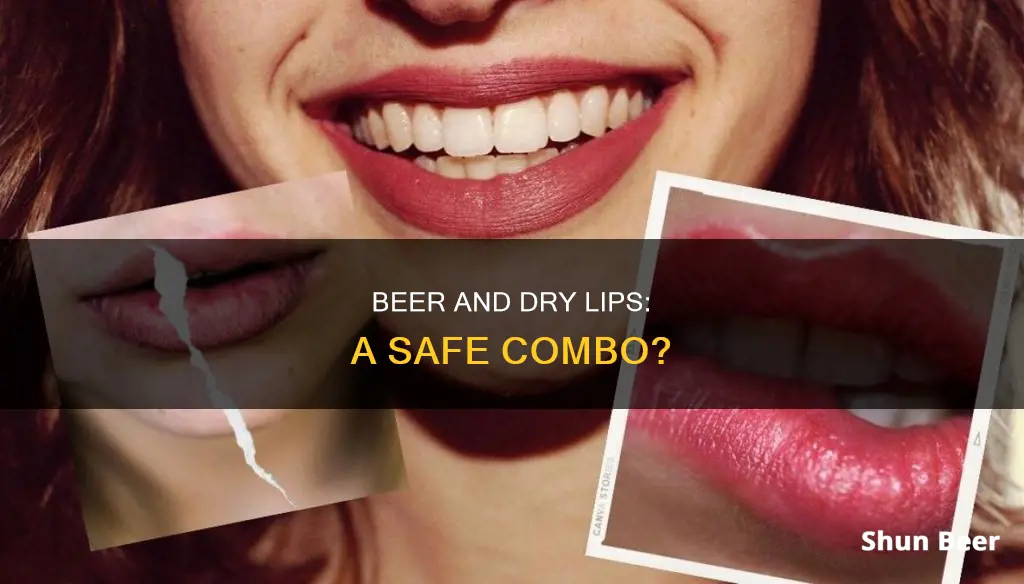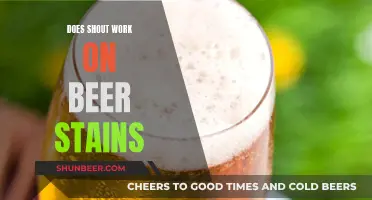
Alcohol is a diuretic, which means it causes the body to lose water and become dehydrated. This can lead to dry lips, especially if the alcohol comes into direct contact with them. Alcohol also affects the amount of saliva the mouth is able to produce, which can lead to a dry mouth and cracked lips.
| Characteristics | Values |
|---|---|
| Effect on lips | Dryness |
| How it affects the lips | Alcohol causes dehydration and reduces saliva production |
| What to do | Avoid alcohol, use lip balm, and consult a dermatologist if the condition persists |
What You'll Learn

Alcohol causes dehydration
Here's a more detailed explanation:
Alcohol's Diuretic Effect
When you consume alcohol, it acts as a diuretic, which means it increases the amount of urine your body produces. This diuretic effect is one of the main reasons why alcohol causes dehydration. The diuretic effect of alcohol can be understood by looking at its impact on the body's fluid balance mechanisms.
Impact on Fluid Balance Mechanisms
Alcohol interferes with the body's natural mechanisms for regulating water levels. Specifically, alcohol reduces the production of a hormone called vasopressin or anti-diuretic hormone (ADH). This hormone is responsible for controlling urine production, and when alcohol suppresses its release, it leads to increased urination. As a result, your body loses more fluids than usual, contributing to dehydration.
Dehydration and Dry Lips
Dehydration caused by alcohol consumption can lead to dry lips. This is because dehydration affects the body's ability to produce saliva, which is essential for maintaining moist lips and oral health. Drinking alcohol, especially in substantial quantities, can change your salivary flow rate and lead to a condition known as dry mouth or xerostomia.
Preventing Dehydration
To prevent dehydration when consuming alcohol, it is important to take some precautionary measures. These include drinking in moderation, drinking slowly, and alternating alcoholic drinks with water or other hydrating beverages. It is also advisable to drink water regularly and consume hydrating foods to maintain proper fluid levels in the body.
In conclusion, alcohol causes dehydration primarily due to its diuretic effect, which increases urination and fluid loss from the body. This dehydration can lead to dry lips and other health issues. Therefore, it is important to be mindful of alcohol consumption and take steps to stay hydrated before, during, and after drinking alcohol.
Beer Drinking in Oklahoma: Sunday's Special Rule
You may want to see also

Alcohol causes decreased saliva production
Alcohol consumption can cause dry mouth, also known as xerostomia, which is a condition that arises when there is little to no saliva in the mouth. Alcohol affects the amount of saliva the mouth is able to produce. Similar to caffeine, drinking alcohol can alter the balance of bacteria in the mouth, increasing the "bad" bacteria and lowering the amount of "good" bacteria, which can ultimately change the microbiome in the mouth. This can lead to a "decreased flow rate" of saliva.
The salivary glands are responsible for producing saliva, and alcohol can affect their functioning. Alcohol can cause a decrease in salivary secretion, leading to reduced saliva production. This reduction in saliva flow can have several negative consequences for oral and overall health.
Dry mouth can cause various oral health complications, including difficulty in chewing and swallowing, which can then result in poor nutrition. It can also lead to an increase in plaque buildup, tooth decay, and gum disease. Additionally, dry mouth can cause mouth sores or sores at the corners of the mouth and increase the risk of yeast infections in the mouth, such as thrush.
The effects of alcohol on saliva production are significant, and it is essential to be aware of these impacts to make informed decisions regarding alcohol consumption and oral health.
Luther's Legacy: Beer and Beliefs
You may want to see also

Alcohol causes increased bad bacteria in the mouth
Alcohol consumption can have a detrimental effect on the bacteria in the mouth, increasing the amount of "bad" bacteria and reducing the amount of "good" bacteria.
Alcohol is a potent antibacterial agent, which means it will kill most bacteria it comes into contact with, including the bacteria that fight against other harmful bacteria. This can leave teeth and gums vulnerable to infection and disease.
The "good" bacteria in the mouth are part of a community of microbes known as the oral microbiome, which also includes some harmful bacteria. When in balance, the oral microbiome protects the mouth and the rest of the body. However, alcohol can easily disrupt this balance, leading to oral and overall disease.
Research has found that people who consume one or more alcoholic drinks a day have more harmful bacteria in their mouths than non-drinkers. These bacteria have been linked to gum disease, cancer, and heart disease. One study of over 39,000 people found that drinking alcohol frequently was associated with an increased risk of periodontal disease.
In addition to increasing harmful bacteria, alcohol also reduces the amount of saliva produced in the mouth. Saliva is composed of 99% water and keeps teeth coated in antimicrobial peptides and antibodies, protecting gums and teeth. Dehydration caused by alcohol consumption significantly reduces saliva production, impacting oral health.
Beer Overload: Congestive Heart Failure Risk?
You may want to see also

Alcohol causes cracked lips
Alcohol consumption can lead to cracked lips in several ways. Firstly, alcohol is a diuretic, meaning it increases urine production and leads to dehydration. Dehydration is a significant cause of dry skin and lips, as the body does not have enough water to maintain proper moisture levels. This is exacerbated by alcohol's impact on the salivary glands, reducing saliva production and further contributing to dryness in the mouth and lips.
Secondly, alcohol affects the balance of bacteria in the mouth, increasing "bad" bacteria and decreasing "good" bacteria. This change in the oral microbiome can also lead to a decrease in saliva production, further drying out the lips.
Thirdly, alcohol can cause nutritional deficiencies, particularly vitamin deficiencies, which can contribute to dry and cracked lips. This is especially true for those with alcohol addiction, as excessive alcohol use interferes with the body's vitamin absorption.
Finally, direct contact between alcoholic beverages and the lips can have a drying effect, further exacerbating the problem. Therefore, it is essential to avoid alcohol consumption and direct contact with alcohol when dealing with dry or cracked lips.
To treat and prevent cracked lips caused by alcohol consumption, it is crucial to focus on rehydration and increasing moisture levels in the body and lips. This can be achieved by increasing water intake, using a humidifier, and applying lip balms that moisturize and protect the lips. Additionally, avoiding alcohol consumption and direct contact with alcohol is essential for allowing the lips to heal and preventing further dryness and cracking.
Beer and Gabapentin: A Safe Mix?
You may want to see also

Lipstick can cause dry lips
Drinking alcohol can cause dry lips. Research has found that alcohol can worsen dry mouth symptoms, which can lead to cracked lips, tooth decay, sores, and general discomfort. Alcohol affects the amount of saliva our mouths produce, increasing "bad" bacteria and reducing "good" bacteria, which can change the microbiome in our mouths. This leads to a decreased flow rate of saliva.
Lipstick can also cause dry lips. Here are some reasons why:
- Ingredients: Matte lipstick, in particular, has more wax and pigment and less oil. This makes the texture of the lipstick drier and more likely to settle into the cracks and crevices of the lips.
- Application: If you start applying lipstick to your upper lip first, you may end up with more product on your upper lip than your lower lip. It's easier to fix mistakes on the lower lip, so experts suggest starting there.
- Rubbing Lips: Rubbing your lips can spoil the look of your lipstick and increase the drying of your lips, making them look flaky and streaky.
- Biting Lips: Biting your lips when anxious can cause injury, pain, soreness, and redness.
- Not Removing Lipstick Before Sleeping: Lipstick can cause damage to your lips overnight. The gaps between the lip lines can trap dirt and residue, leading to discolouration.
- Choosing the Wrong Lipstick: Most matte lipsticks are formulated with alcohol and little to no oil, causing your lips to dry out. Opt for lipsticks with ingredients that prevent water loss and soothe your lips.
To prevent dry lips, it is best to cut out alcohol consumption and choose the right lipstick formulas for your lips.
Old Beer, Safe to Drink?
You may want to see also
Frequently asked questions
No, it is not recommended to drink beer or any alcoholic beverage if you have dry lips. Alcohol causes dehydration and will worsen your dry lips.
Dry lips are caused by a lack of moisture in the air, fever, or constantly biting your lips.
You can treat dry lips by keeping them hydrated. Avoid licking your lips as this will only make them drier. Instead, use lip balm with petroleum jelly or natural ingredients.
In addition to alcohol, you should also avoid caffeine and smoking as these can cause dehydration and aggravate dry lips.







